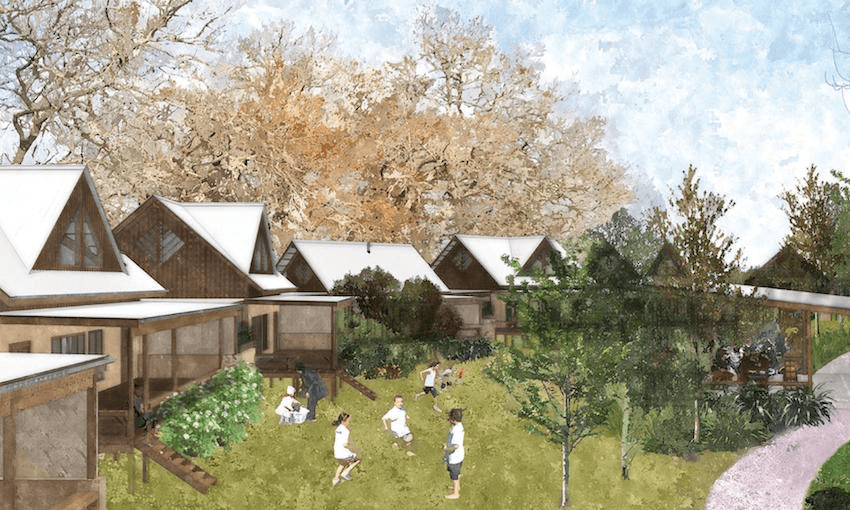Architectural designer and housing advocate Jade Kake is leading a number of projects (and conversations) on the rejuvenation of Māori housing and land. Here she looks at the current housing climate and what needs to change before Māori can have agency over their housing aspirations.
We’re at a really interesting point in time politically.
The land protectors at Ihumātao have been making headlines for the continued occupation (and potentially, setting new legal precedents, depending on whatever move the government makes next). Ngāpuhi have continued to hold the line on sovereignty, resisting efforts by the Crown to corral us into a predetermined outcome. Taitamariki worldwide are taking a stand on climate change, which we have all now come to understand is undeniably an indigenous issue.
Like our taitamariki, who are fed up with previous generations riding rough shod over our future and are refusing to accept the continuation of ruinous behaviours and unsustainable systems, as Māori we are increasingly refusing to accept the minimum because historically, that’s all that has been offered to us. Our mainstream systems continue to fail Māori, and Treaty settlement processes still only return a tiny fraction of what was lost.
Yet there are pockets of hope and resistance. Whānau and hapū-led papakāinga and whenua development initiatives are persevering and even thriving despite the barriers and challenges to doing so. There are success stories, and these are worth celebrating. The continued and sustained government support for Māori housing and economic development initiatives (for the most part, administered by Te Puni Kōkiri) has been a big part of these success stories. Building whānau and hapū capacity and capability is key.
In the wake of issues such as Oranga Tamariki and Ihumātao, the current Labour-led government, with its progressive centre left politics and record setting number of Māori MPs, has been a disappointment to many Māori. Many acknowledge, however, that the party-political system does not and cannot truly serve Māori interests.
In the Beehive, we now have not one but five housing Ministers, including Associate Minister of Housing (Māori Housing), Nanaia Mahuta. This appointment has been significant, and the changes made within government have been structural and meaningful.
The government recently formed Kāinga Ora, the new urban development authority that will combine Housing New Zealand Corporation, HLC, and the Kiwibuild programme. Regrettably, the inaugural board does not have any Māori Directors, although Māori housing advocate Te Matapihi has made the expectation clear – the two remaining roles (which are currently being recruited) must be filled by Māori Directors.
Kāinga Ora has the potential to be a game changer, if iwi and hapū Māori are meaningfully embedded in both the organisation and the urban regeneration process. This means Māori representation at every level – starting from the top. In the book Rebuilding the Kāinga I talk about a model for integrated development on whenua Māori but I think the concept can equally be applied to housing and neighbourhood development on general title land (with consideration given to the power dynamics, and the leading role of mana whenua in these processes).
Something I am hopeful about is the shift of the Kāinga Whenua loan product from Housing New Zealand to Kāinga Ora. I am hopeful that serious reform is on the cards, as Māori housing finance reform is what’s needed to significantly progress Māori housing aspirations on both whenua Māori and general title land. In the book I sketch out a number of options for finance reform, with a particular focus on international models. None of these are new ideas, but the adaption to our unique social and political context is something that bears further consideration.
Policy changes are important and necessary, but the bigger issue is the return of the control of land and resources. Sovereignty has always been about power and control. The transfer of power is something our Crown-led settlement process has not quite managed to get right (although recent legal innovations such as co-management agreements and granting personhood to maunga, awa and ngāhere are an important step in the right direction).
Something I talk about in the book is the fundamental mismatch between our iwi asset-holding entities, and our whānau and hapū-based land management entities. I believe there needs to be a greater alignment between these. By better aligning our pre-colonial economic unit (the kāinga) to our social organising units (of whānau, hapū and iwi, that have more or less persisted uninterrupted since before colonisation), I believe we will have a greater ability to assert our hapū rangatiratanga and regain our sovereignty.
Now is the time to seriously rethink our settlement patterns, our Treaty settlement processes and associated governance systems, and our wider political and economic systems. I believe the notion of rebuilding our kāinga is an idea whose time has come.
See Jade Kake live in conversation at City Gallery on October 14.
